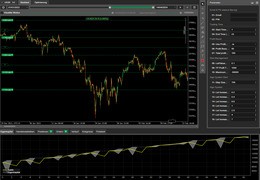Between reality and illusion If you want to know what trading really means—beyond luxury cars, piles of cash, and...
Prop Trading: The Illusion of Quick Success – Why Real Trading is the Better Choice
Prop trading is often marketed as a way to make big profits without investing a lot of your own capital. But the reality is very different. Prop trading companies lure traders with promising offers, but in the end it is the companies - not the traders - who profit. If you really want to trade profitably, it is crucial to understand the business model behind prop trading and know the alternatives. Here you will find out why prop trading is a deception and why you will be more successful in the long term with your own capital and a leverage of 1:500 .
1. No real capital: Prop companies use demo accounts
The great deception in prop trading begins with the fact that many traders believe they are trading with real capital. In reality, prop firms almost always work with demo accounts , i.e. virtual money. There is no risk for the prop firm. They generate income not through the success of traders, but through the fees that traders pay for participating in challenges. These tests are often structured in such a way that most participants fail and have to pay again.
Prop companies risk nothing while you believe you are trading on the real markets. Your supposed "access to capital" is in most cases nothing more than an illusion.
2. Low profit sharing: Maximum 80% – often much less
Even if you trade successfully and meet the prop company's strict requirements, you rarely get more than 80% of the profits . In fact, many companies offer as little as 50% to 70% . This means you do the hard work, bear the risk (even emotionally), while the company keeps the majority of the profits. In most cases, there is hardly anything left after taxes and fees.
In comparison, with your own account you keep 100% of the profits . If you work with a leverage of 1:500 and a starting capital of 2,000 euros, you could regularly earn 400 euros per month with a return of 20% - all for yourself, with no profit deductions.
3. Good coaches and real traders would never recommend prop trading
Real trading professionals and coaches with real market experience never recommend prop trading. Why? Because they know that it is not a long-term solution for being sustainably profitable. Prop trading offers you no real capital, no freedom and, above all, no long-term success. Most of those who recommend prop trading are influencers or people who receive commissions from the companies to lure new traders into the system.
Real traders know that it is important to work with their own capital and to build a solid strategy based on risk and capital management . They know the markets and know that only sustainable trading will bring long-term success - and you cannot achieve that through prop trading.
4. No long-term winners in prop trading
One crucial point: There are no long-term winners at prop trading firms. Even if you have a phase where you make profits, it will be difficult to make a living from it in the long run. The strict regulations, the high fees and the low profit sharing ensure that traders rarely remain profitable in the long term. Prop firms live off the challenges they impose on you, not from your long-term success.
Real, successful traders rely on independent trading and use tools like copy trading to maximize their profits. Instead of struggling with prop trading, you can generate sustainable returns with your own account and a clear strategy and multiply them using platforms like copy trading.
5. Tax obligations and additional costs: Prop trading is not profitable
Many traders forget that profits from prop trading are taxable . As soon as you receive payouts, you have to pay taxes on your earnings. In many countries, you also need a business license to trade legally. In addition, there are costs for health insurance and tax advisors , which add up and further reduce your profits.
Having your own account allows you to better plan your finances and avoid external costs minimizing your returns. It is much easier to develop a sustainable trading strategy when you have complete control over your own financial situation.
6. Time-consuming and questionable benefits: Prop trading is not worth it
Another disadvantage of prop trading is the enormous amount of time it takes . Not only do you have to fight your way through strict challenges, but you also have to constantly follow rules that often have more to do with the security of the prop company than with effective trading. The benefit is out of proportion to the effort. In the time you spend dealing with the requirements of the prop company, you could already be making real, sustainable profits with your own account.
7. Scaling opportunities: More profits with your own account and copy trading
If you trade with your own capital and make regular profits , you can scale your earnings through copy trading . You allow other traders to copy your trades and receive a commission for doing so. This is a great way to multiply your profits without having to take additional risks.
Unlike prop trading, where your profit share is limited, copy trading allows you to build additional passive income by simply doing what you already do: trading successfully.
Prop trading is an illusion – own capital is the better way
Prop trading may seem tempting at first glance, but it has little to do with real trading. You usually work with demo accounts , receive only a fraction of the profits and are faced with tax obligations and additional costs. Real traders and coaches never recommend prop trading because they know that it does not offer profitable solutions in the long term.
If you really want to trade successfully, use your own capital and a leverage of 1:500 . You keep 100% of your profits, can scale your strategy through copy trading and build a sustainable income - without getting involved in the questionable offers of prop trading companies.

















